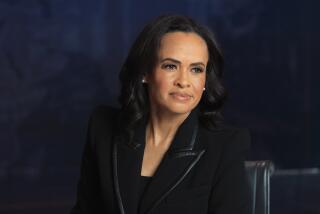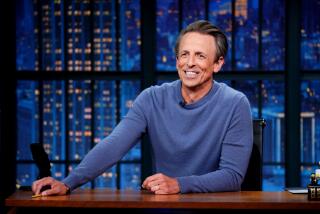âNightlineâ Mines for Nuggets From an Infomercial
You wonât find Ted Koppel at this yearâs Democratic National Convention, just as he was an on-site no-show for the Republican gathering in Philadelphia.
Koppel, the esteemed anchor of ABCâs âNightline,â pointedly left the Republican convention after its second night in 1996, declaring the proceedings âmore of an infomercial than a news event.â This year, with Koppel again staying home, âNightlineâsâ mandate at both major party conventions has been to take that infomercial and use it as a jumping-off point for more penetrating analysis of campaign issues.
Far from defensive about the diminished time provided by the broadcast networks, Koppel said Monday that cable channels are being excessively generous with their wall-to-wall convention coverage.
âThey do it because they can,â Koppel suggested. âIâm not sure thatâs what journalism requires of us.â
With Koppel keeping his distance, the task of reporting from the convention has largely fallen to ABC News correspondent Chris Bury and a team of producers in Los Angeles, who, in typical âNightlineâ fashion, continue to nip, tuck and tinker with the program until its live broadcast to the East Coast.
Indeed, last week, two Reform Party candidates were actually in the studio waiting to go on when the producers decided to change directions, delaying that story to another night.
On Monday, Bury and company were furiously working on a quartet of taped pieces to open the program each night of the convention, typically running 6 to 7 minutes apiece.
By leaving in â96, Bury said, Koppel was sending a signal âthat conventions are no longer so [newsworthy] that an anchor has to be there to signify their importance.â
âIf there is real news, if there is more than an infomercial, weâll go with it,â added âNightlineâ executive producer Tom Bettag, who has remained in Washington, D.C. The challenge, he noted, is how to provide a service to the viewer âif thereâs no âthereâ there.â
By the time the âNightlineâ staffâs day began at 8 a.m. Monday in the form of a conference call with producers in Washington, the weekâs lineup of stories had already been blocked out: Mondayâs show dealt with, as Bury put it, âHow does Al Gore deal with a [Bill Clinton] legacy that he wants to embrace and escape simultaneously?â
The tentative premise for Tuesday hinged on whether the political left has been left out of the convention.
Tonightâs broadcast looks into the Hollywood-Washington connection and, despite presumptive vice presidential nominee Joseph I. Liebermanâs broadsides at Hollywood, several top TV producers declined invitations to appear. (Bury missed the conference call to interview William Bennett, an outspoken critic of Hollywood and a Lieberman ally.)
Thursdayâs will chronicle the evolution of Al Gore as a candidate.
The planning, however, plays out against its own mini-drama: Buryâs report will almost certainly lead Mondayâs program, but Koppelâs daughter is due to give birth any moment, and thereâs some question whether he will be available to host the show.
Uncertainty also lingers about what guests will be booked during the week. There was still a chance Monday morning, for example, that Hillary Rodham Clinton would appear that evening, but ânobody should hold their breath at this point,â said senior producer Richard Harris.
The Los Angeles staff huddles in the small conference room, sparsely furnished except for a dozen TV monitors tracking whatâs on ABC and elsewhere. Rick Rockwell, the would-be groom from Foxâs âWho Wants to Be a Multi-Millionaire?,â can be seen on ABCâs âThe Viewâ in the background.
Among potential breaking developments that could derail convention plans is news that a Russian nuclear submarine has sunk, with talk of a rescue mission. Producer Leroy Sievers, in Washington, admits the scenario âsounds like a bad movieâ and could merit coverage later in the week depending on how it plays out.
âWe Know About the Clinton Speechesâ
Correspondents like Bury take as a given that all their work crafting a taped piece can be scuttled at a momentâs notice as âNightlineâ keeps a close eye on other developments, including protests outside Staples Center.
âWere something huge to happen, we would ditch this program in a second and cover that,â Bury said. âThe same goes for any other night. But if there isnât, if you donât have a target set, youâre going to be in trouble.â
With President Clinton as the main attraction Monday, the consensus is that the evening may run late. His address is scheduled to start around 7:30 p.m. and last 30 minutes. âBut we know about the Clinton speeches,â Harris said.
The meeting concludes, and producer Madhulika Sikka segues to a small edit bay to assemble Mondayâs report. A different producer supervises each dayâs package, while Bury continues polishing his scripts and conducting interviews.
Even before the convention opened, the volume of coverage itself has become politicized. Republican National Committee Chairman Jim Nicholson wrote to major network news divisions stressing that they should devote ânot a minute moreâ to the Democrats than they did the GOP in Philadelphia.
âIâll leave it to the politicians to keep score, and weâll report the news,â Koppel responded.
According to Bettag, the audience will accept variations in the time afforded to each convention as long as such deviations are explained. âIf you give them a good reason, theyâll buy it,â he said.
As expected, Hillary Clinton does not appear. Beyond Buryâs report, which incorporates passages of Clintonâs speech, ABC relies on political analysts David Gergen and George Stephanopoulos to characterize âwhat are they really trying to sell here,â Bettag said. Within ABC, the pair have been dubbed âGergenopoulos,â the same sort of melded monster Washington Post reporters Bob Woodward and Carl Bernstein became (in their case âWoodsteinâ) while covering the Watergate scandal in the early 1970s.
Producers assume that most viewers have seen at least part of the prime-time festivities. âBy the time 11:35 rolls around, what we can offer people is perspective and context,â Harris said. âWeâre purposely trying not to do just a highlights program.â
Later in the day, Koppelâs daughter goes into labor, meaning Bury may have to anchor the show. Just in case, Bury puts his other work on hold and begins pounding out an introduction.
After 6 p.m., however, the call comes: Koppel has his second grandson and he will anchor the broadcast, but from New York instead of Washington.
On a second front, âMonday Night Footballâ--a preseason rematch of Super Bowl combatants St. Louis and Tennessee--is running long, threatening to cut into Hillary Clintonâs speech. The game finally ends about 7:10 p.m. Pacific time, which doesnât pose a logistical problem as it turns out--despite some tense moments--because the convention is running late as well.
President Clinton, not surprisingly, goes past his allotted time. His speech lasts until 8:40 p.m., meaning that âNightlineâ wonât get on the air in most of the country until well after midnight on the East Coast. The crew shrugs it off. Being flexible, after all, comes with the territory.
More to Read
Get the L.A. Times Politics newsletter
Deeply reported insights into legislation, politics and policy from Sacramento, Washington and beyond. In your inbox three times per week.
You may occasionally receive promotional content from the Los Angeles Times.










